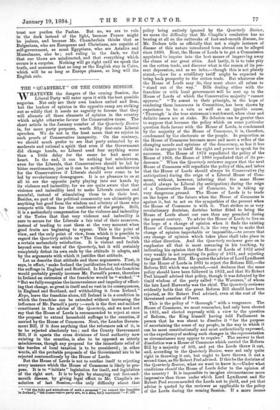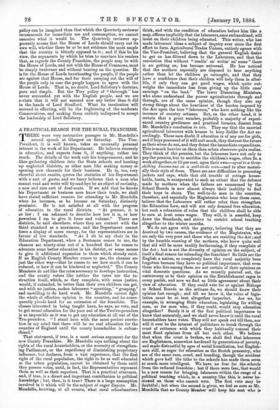THE " QUARTERLY " ON THE COMING SESSION.
WHATEVER the dangers of the coming Session, the Liberal Party will enter upon it with the best possible auguries. Not only are their own leaders united and firm, but the leaders of opinion in the opposite camp are striking out so wildly that it needs no sagacity to foresee that they will alienate all those elements of opinion in the country which might otherwise favour the Conservative cause. The short article in the January number of the Quarterly Review is, for mere party purposes, worth fifty first-rate Liberal speeches. We do not in the least mean that we rejoice in such proofs of Conservative incapacity. • On the contrary, we should much prefer to see that party animated by so moderate and rational a spirit that even if the Government did change hands, no Liberal need fear anything worse than a little delay for the cause he had most at heart. In the end, it can be nothing but mischievous, even for the Liberals, that Conservatives should be led by bitter reactionaries, just as it can be nothing but mischievous for the Conservatives if Liberals should ever come to be led by revolutionary demagogues. It is no pleasure to us at all to see the opposite party playing into our hands by its violence and imbecility, for we are quite aware that that violence and imbecility tend to make Liberals careless and scornful, instead of stimulating them to do their best. Besides, no part of the political community can ultimately get anything but good from the wisdom and sobriety of those who compete with them for the confidence of the people. Still, it is a Taelancholy compensation for the violence and imbecility of the Tories that that very violence and imbecility is sure to secure for the Liberals a fair trial of their measures, instead of tending to oust them at the very moment when good fruits are beginning to appear. This is the point of view, and the only point of view, from which it is possible to regard the Quarterly article on 'The Coming Session 'S with a certain melancholy satisfaction. It is violent and foolish beyond even the wont of the Quarterly, but it will certainly completely defeat its own ends by the attitude it adopts, and by the arguments with which it justifies that attitude.
Let us describe that attitude and these arguments. First, it says, in effect, make Ireland the justification for not extending the suffrage in England and Scotland. In Ireland, the franchise would probably greatly increase Mr. Parnell's power, therefore in Ireland an extension of the franchise would be "wicked." '* "But we fully recognise the inconvenience and impolicy of effect- ing that change, so great in itself and so vast in its consequences, in England and Scotland, and withholding it from Ireland." Ergo, leave the franchise alone, till Ireland is in a condition in which the franchise can be extended without increasing the influence of Mr. Parnell's party :—such is the first and mildest • constituent in the advice of the Quarterly, and we need not say that the House of Lords is recommended to reject at once the proposal to extend household suffrage to the counties, if carried by the House of Commons. Next, the London Govern- ment Bill, if it does anything that the reformers ask of it, is to be rejected absolutely too ; and the County Government Bill, if it upsets the cross divisions of local authority now existing in the counties, is also to be opposed as utterly mischievous, though any proposal for the immediate relief of the burden of local taxation is to be considered ; in other words, all the probable proposals of the Government are to be rejected contumeliously by the House of Lords. But the House of Lords is not to confine itself to rejecting every measure which the House of Commons is likely to pro- pose. It is to "initiate" legislation for itself, and legislation of the right sort. It is to begin by stamping out foot-and- mouth disease, by giving legal effect to Mr. Chaplin's re- solution of last Session,—the only difficulty about that
• Of the folly and wickedness of such a proposal " Ito extend the franchise In Ireland], " the Conservative party are, to a man, fahy convinced.'—P. 279.
policy being entirely ignored by the Quarterly Review, we mean the difficulty that Mr. Chaplin's resolution has no bearing at all on the outbreaks of foot-and-mouth disease, for Mr. Dodson tells us officially that not a single instance of disease of this nature introduced from abroad can be alleged since 1880. Next, the House of Lords is to get a Commission appointed to inquire into the best means of improving away the slums of our great cities. And lastly, it is to take pity on the cotton trade, and discover what is the reason of its pre- sent depression, and as we infer,—though this is not plainly stated,—how far a retaliatory tariff might be expected to bring back prosperity to the cotton trade. But whatever else the House of Lords may do, they must above all refuse to "stand out of the way." Bills dealing either with the franchise or with local government will be sent up to the House of Lords of which the Conservative majority "cannot approve." " To assent to their principle, in the hope of rendering them innocuous in Committee, has been shown by experience to be a vain as well as an ignoble course.
'Thorough' is the true statesman's watchword, when clear and definite issues are at stake. No delusion can be greater than to suppose that because the policy which on some particular question finds favour with the House of Lords, is condemned by the majority of the House of Commons, it is, therefore, condemned by the electorate or the people. In proportion as the House of Commons becomes more and more a reflex of the changing moods and opinions of the democracy, so has it less claim to arrogate to itself the right and power to speak for its successor. The House of 1874 repudiated the policy of the House of 1868, the House of 1880 repudiated that of its pre- decessor." When the Quarterly reviewer argues that the next House of Commons will repudiate the policy of this, and infers that the House of Lords should always be Conservative (by anticipation) during the reign of a Liberal House of Com- mons, without, however, inferring that the same House should always be Liberal (by anticipation) during the reign of a Conservative House of Commons, he is taking up very dangerous ground. The House of Lords is to trade on the hopes of the future when the House of Commons is against it, but to act on the sympathies of the present when the House of Commons is with it. That strikes us as very revolutionary doctrine, doctrine better fitted to bring the House of Lords about our ears than any preached during the present century. To advise the House of Lords to live on the hope of a change of opinion when it finds the existing House of Commons against it, is the very way to make that change of opinion improbable or impossible,—to secure that any change of opinion which takes place shall take place in the other direction. And the Quarterly reviewer goes on to emphasize all that is most menacing in his teaching, by indicating his opinion that the House of Lords of 1832 acted very weakly in not repeating its policy of 1831, and rejecting the great Reform Bill. He quotes the advice of Lord Lyndhurst to the House of Lords in 1831 to reject the Reform Bill,—the Reform Bill which was rejected,—and declares that the same policy should have been followed in 1832, and that Sir Robert Peel himself advised that policy, though it was defeated by the timid wisdom of the party called "the Waverers," of whom the late Lord Harrowby was the chief. The Quarterly reviewer evidently holds that the great Reform Bill should have been rejected, as Sir Robert Peel advised, even at the cost of the threatened creation of Peers.
This is the policy of "thorough" with a vengeance. The House of Commons, we must remember, had only been elected in 1831, and elected expressly with a view to the question of Reform, the King himself having told Parliament in person that he was about to dissolve it "for the purpose of ascertaining the sense of my people, in the way in which it can be most constitutionally and most authentically expressed, on the expediency of making such changes in the representation as circumstances may appear to require." The answer to that dissolution was a House of Commons which carried the Reform Bill by a majority of 109, and yet the Lords threw it out, and, according to the Quarterly Review, were not only quite right in throwing it out, but ought to have thrown it out a second time, as Sir Robert Peel advised. If this be the doctrine of
the Quarterly Review, what we want to know is,—Under what conditions shoidd the House of Lords defer to the opinion of
the country ? It is impossible to imagine circumstances more impressive than those under which Lord Lyndhurst and Sir Robert Peel recommended the Lords not to yield, and yet that advice is quoted by the reviewer as applicable to the policy of the Lords during the coming Session. If a more insane policy can be imagined than that which the Quarterly reviewer recommends for immediate use and consumption, we cannot conceive what it would be. The• Quarterly reviewer ap- parently means that the House of Lords should carry out its own will, whether there be or be not evidence the most ample that the country is bitterly opposed to it ; and if this be his view, the arguments by which he tries to convince his readers that, as regards the County Franchise, the people may be with the House of Lords, and not with the House of Commons, must be simply irrelevant and without bearing on the question. He is for the House of Lords browbeating the people, if the people are against that House, and for their carrying out the will of the people only in case the people happen to agree with the House of Lords. That is, no doubt, Lord Salisbury's doctrine, pure and simple. But the Tory policy of " thorough " has never succeeded yet with the English people, and we are cartain that it will not succeed now any better than it did in the hands of Lord Strafford. What its inculcation will succeed in effecting, will be the frightening of the moderate Conservatives, and making them entirely indisposed to accept the leadership of Lord Salisbury.



































 Previous page
Previous page